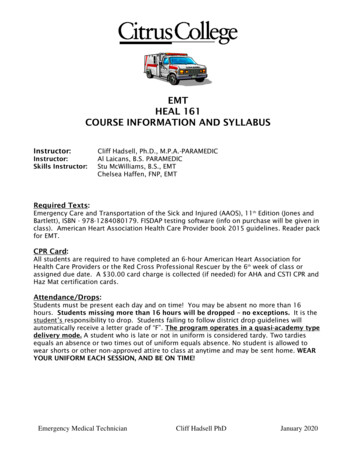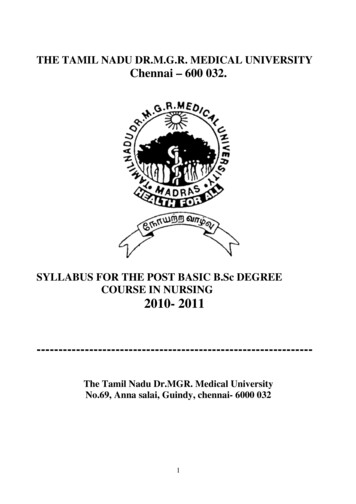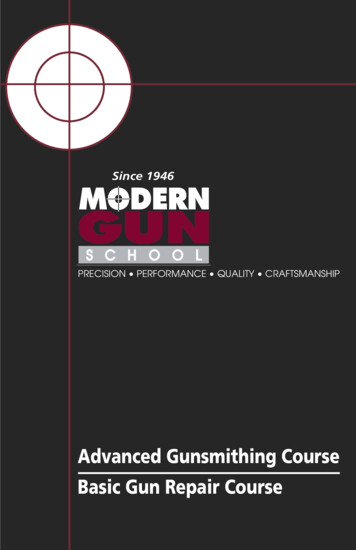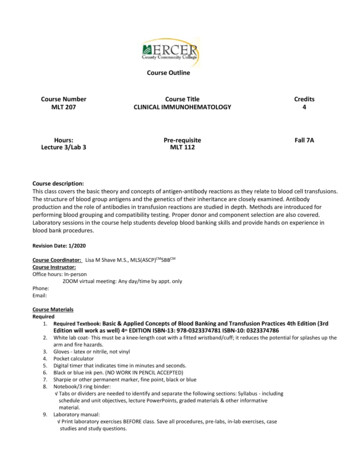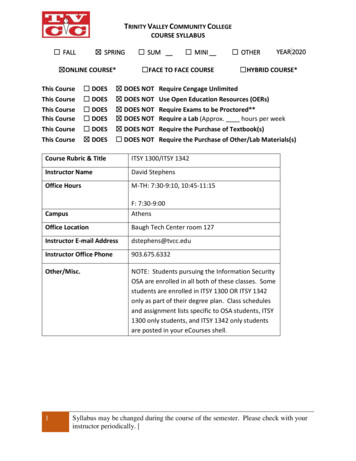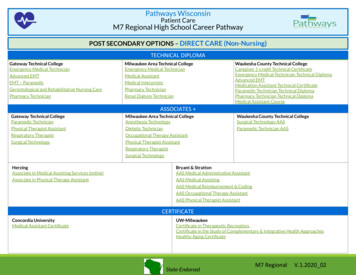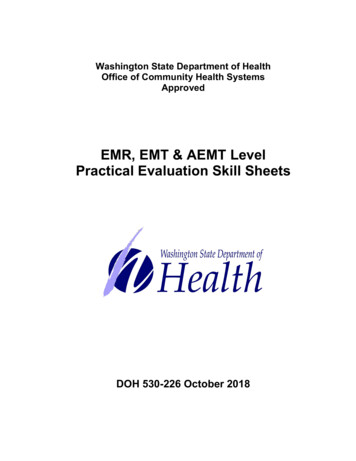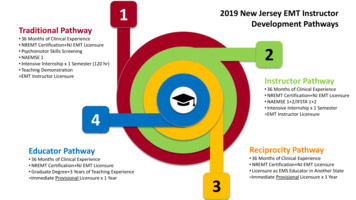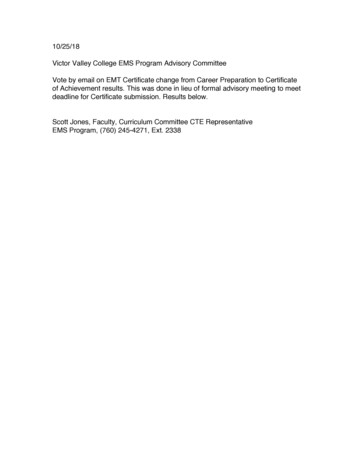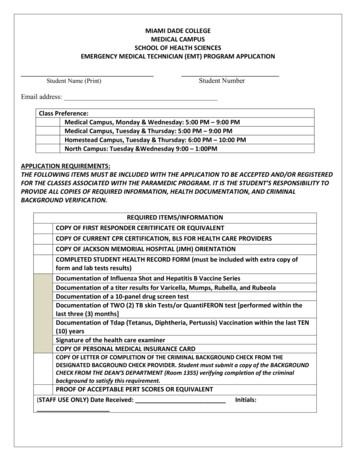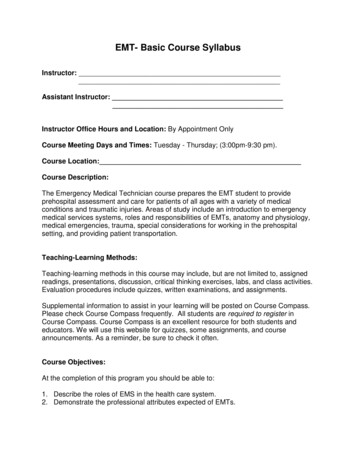
Transcription
EMT- Basic Course SyllabusInstructor:Assistant Instructor:Instructor Office Hours and Location: By Appointment OnlyCourse Meeting Days and Times: Tuesday - Thursday; (3:00pm-9:30 pm).Course Location:Course Description:The Emergency Medical Technician course prepares the EMT student to provideprehospital assessment and care for patients of all ages with a variety of medicalconditions and traumatic injuries. Areas of study include an introduction to emergencymedical services systems, roles and responsibilities of EMTs, anatomy and physiology,medical emergencies, trauma, special considerations for working in the prehospitalsetting, and providing patient transportation.Teaching-Learning Methods:Teaching-learning methods in this course may include, but are not limited to, assignedreadings, presentations, discussion, critical thinking exercises, labs, and class activities.Evaluation procedures include quizzes, written examinations, and assignments.Supplemental information to assist in your learning will be posted on Course Compass.Please check Course Compass frequently. All students are required to register inCourse Compass. Course Compass is an excellent resource for both students andeducators. We will use this website for quizzes, some assignments, and courseannouncements. As a reminder, be sure to check it often.Course Objectives:At the completion of this program you should be able to:1. Describe the roles of EMS in the health care system.2. Demonstrate the professional attributes expected of EMTs.
3. Perform the roles and responsibilities of an EMT with regard to personal safety andwellness, as well as the safety of others.4. Perform the duties of an EMT with regard for medical-legal and ethical issues,including functioning under medical direction and within the scope of practice.5. Apply principles of anatomy, physiology, pathophysiology, life-span development,and therapeutic communications to the assessment and management of patients.6. Identify the need for and perform immediately life-saving interventions to manage apatient’s airway, breathing, and circulation.7. Assess and manage patients of all ages with a variety of complaints, medicalconditions and traumatic injuries.8. Apply principles of emergency medical services operations, including considerationsin ambulance and air medical transportation, multiple casualty incidents, gainingaccess to and extricating patients, hazardous materials incidents, and responding tosituations involving weapons of mass destruction.Course Textbook:Mistovitch, J. and Karren, K. (2010). Prehospital Emergency Care, 9th edition. UpperSaddle River, NJ: Brady Books.Course Completion Requirements:Successful completion of this course requires adherence to course policies, maintaininga course average of 70 %, a minimum score of 70% on the course final examination,and successfully demonstrating all required skills.Course Attendance Policy:Student attendance is required at all scheduled classes, including lab sessions.Students may be dropped from the course for excessive absences of any kind.Excused absences may be granted by the course instructor for extenuatingcircumstances. If 3 or more absences occur for any reason, the status of the student willbe reviewed by the faculty to determine a disposition. Course failure is likely underthese circumstances.If a student misses any class, he/she is responsible for any missed quizzes,examinations, and material covered in that class session. Prompt arrival is expected atall class activities. It is the student’s responsibility to sign in on the attendance roster.Three tardy and/or leaving early three times will be counted as one unexcused absence;these may be combined, for example, one tardy and leaving early two times will countas one unexcused absence.All quizzes will be online though Course Compass. Quizzes will be placed on thewebsite and students will have 48 hours to complete them. Any student missing a quizwill receive a “0” for that quiz; no exceptions
Comportment:Students are expected to conduct themselves in accordance with the professionalexpectations for EMTs at all times. Students are reminded that they are representativesof the MedExpress EMS Training Center whenever and wherever they are involved withcourse-related activities. Professional conduct is essential to a successful courseexperience and EMS career.Academic Dishonesty:Academic dishonesty in any form will not be tolerated and is grounds for immediatedismissal from the program and other administrative action by the Program. Examplesinclude, but are not limited to:···Cheating in any formFalsification or forgery of academic documents, applications, clinicalevaluations, lab evaluations, etc.Plagiarism (including copying and pasting of electronic text into assigned work)Course Grading and Grading Scale:Semester 1Quizzes45 each worth20 pointsAssignments8 each worth10 pointsEC Quizzes*5 each worth5 pointsExams8 each worth100 pointsFinal Exam1 worth100 pointsSkills Exam1 worth30 pointsStudents must have a minimum of 1,350 points to pass course.Extra Credit Quizzes will only be used toward exam grades below 70% if needed.Grading Scale:90 to 100%80 to 89%70 to 79%60 to 69%Below 60%ABCDF
Course ScheduleEMT BasicDateChapterAssignments, Tests, QuizzesWeek 1Day 1IntroductionsStudents will have the followingassignments every week:Overview of CourseIntroduction to Course Compass andmyemskitStudy Skills and Test-taking TipsChapter Handouts/Homework(10 points per chapter)Weekly Online Assignment(10 points per week)Discussion Questions(5 points per week)Quizzes (20 points each quiz)Day 2Chapter 1 EMS Systems(1.5 hours)Chapter 2 Well Being of EMT(2 hours)Chapter 3 Workforce Safety and Wellness(2 hours)Day 3Chapter 4 Documentation(2 hours)Chapter 5 Communication(1.5 hours)Chapter 6 Lifting and MovingPractice Lifting and Moving Skills(4 hours)
Week 2Day 1Exam I (Chapters 1-6)(1 hour)Review Exam(30 minutes)Chapter 7 Anatomy and Physiology(4 hours)Day 2Chapter 7 Anatomy and Physiology(4 hours)Chapter 8 Pathophysiology(3 hours)Day 3Chapter 8 Pathophysiology(4 hours)Chapter 9Lifespan Development(1.5 hours)Review for Exam
Week 3Day 1Exam II Chapters 7-9(1 hour)Review Exam(30 minutesBegin Clinical Rotations andField Internship Friday of thisweek48 Hours Hospital48 Hours AmbulanceChapter 10 Airway Management(4 hours)Day 2Airway Management Skills Lab(3 hours)Chapter 11 History taking and Vital Signs(2 hours)Day 3Chapter 12 Scene Size-Up(2 hours)Chapter 13 Patient Assessment(4 hours)Airway Management Skills Lab
Week 4Day 1Chapter 13 Patient Assessment(3 hours)Skills Lab2 hours)Review for Exam(30 minutes)Day 2Exam III (Chapters 10-13)(2 hours)Review Exam(1 hour)Chapter 14 Pharmacology(3 hours)Day 3Chapter 15 Shock and Resuscitation(3 hours)Chapter 16 Respiratory Emergencies(3 hours)Skills Lab; Patient Assessment
Week 5Day 1Chapter 17 Cardiology(3 hours)Chapter 18 Altered Mental Status, Stroke(2 hours)Review for Exam(30 minutes)Day 2Exam IV (Chapters 14-18)(1 hour)Review Exam(30 minutes)Chapter 19Seizures and Syncope(1 hour)Chapter 20 Acute Diabetic Emergencies(1 hour)Chapter 21 Anaphylactic Reactions(1 hour)Chapter 22 Toxicological Emergencies(2 hours)Day 3Chapter 23 Abdominal Emergencies (GYNand Renal)(2 hours)Chapter 24Environmental Emergencies(3 hours)
Week 6Day 1Exam V (Chapters 19-26)(1 hour)Review(30 minutes)Chapter 25Submersion and Drowning(2 hours)Chapter 26 Behavioral Emergencies(2 hours)Chapter 27 Trauma Overview(2 hours)Day 2Exam VI (Chapters 19-26))(1 hour)Review(30 minutes)Chapter 28Bleeding and Soft Tissue Injuries(2 hours)Chapter 29 Burns(1 hour)Chapter 30 Musculoskeletal Injuries(1 hour)Day 3Chapter 31 Head Trauma(1 hour)Chapter 32 Spinal Injuries(1 hour)Chapter 33 Eye, Face, and Neck(1 hour)Chapter 34 Chest Trauma(1 hour)Chapter 35 Abdominal Trauma(1 hour)(
Week 7Day 1Chapter 36Multi System Trauma;Special Patients(2 hours)Skills Lab(3 hours)Day 2Skills:Patient AssessmentBandagingSplintingSpinal ImmobilizationReview for Exam(30 minutes)Exam V Chapters 27-36(1 hour)Review Exam(30 Minutes)Chapter 37 OB and Neonate Care(2 hours)Chapter 38 Pediatrics(2 hours)Day 3Skills: Patient AssessmentChapter 39 Geriatrics(2 hours)Chapter 40Patients with Special Needs(2 hours)Skills Lab(1 hour)Review for Exam(30 minutes)Labor and Delivery Clinical beginsFriday this week and continuesuntil Monday next week. Studentsare requires to do one 12-hour shiftin Labor and Delivery.
Week 8Day 1Exam VII – Chapters 37-40(1 hour)Review(30 minutes)Chapter 41 EMS Operations( 1 hour)Chapter 42 Gaining Access andExtrication(1 hour)Day 2Day 3Chapter 43 Hazardous Materials(1 hour)Chapter 44MCI and Incident Management System(3 hours)Chapter 45WMD andEMS Response to Terrorism(3 hours)Exam VII Chapters 41-45(1 hour)Exam 8 Review & Review for Final(3 hours)Skills Lab(3 hours)Day 1Day 2Day 3Week 9Course Final Witten Exam(2 hour)Skills Lab(4 hours)Final Skills ExamFinal Skills Exam Retest(If Needed)Skills Lab:All Skills LeanedPractice for Final Skills ExamSkills Lab:All skills LearnedSkills Performed According toNREMT Skill SheetsSkills Performed According toNREMT Skill SheetsAll Completed Clinical PacketsDueNO EXCEPTIONS
Weekly Online Assignment (10 points per week) Discussion Questions (5 points per week) Quizzes (20 points each quiz) Day 2 Chapter 1 EMS Systems (1.5 hours) Chapter 2 Well Being of EMT (2 hours) Chapter 3 Workforce Safety and Wellness (2 hours) Day 3 Chapter 4 Documentation (2 hours) Chapter 5 Communication (1.5 hours)
